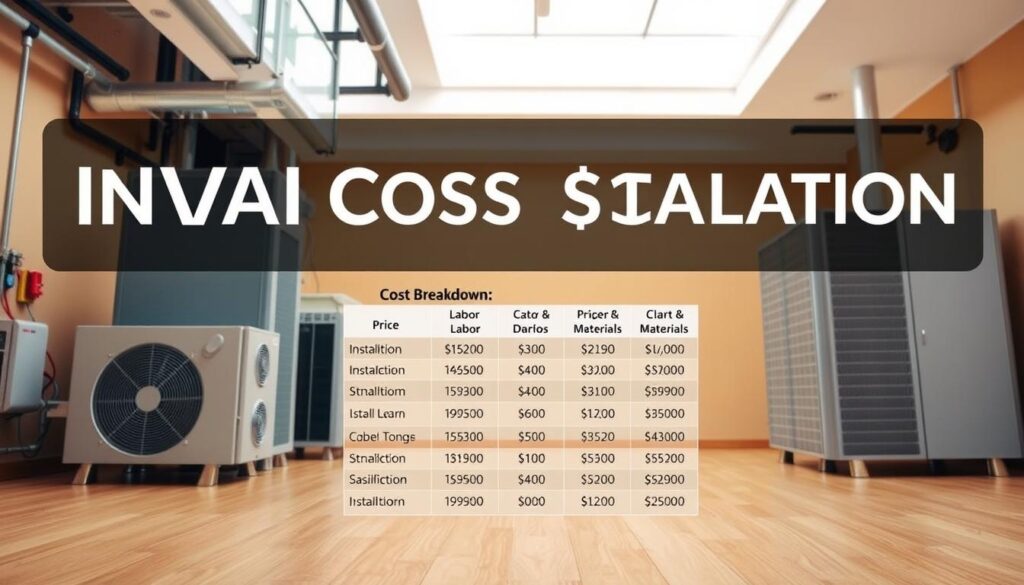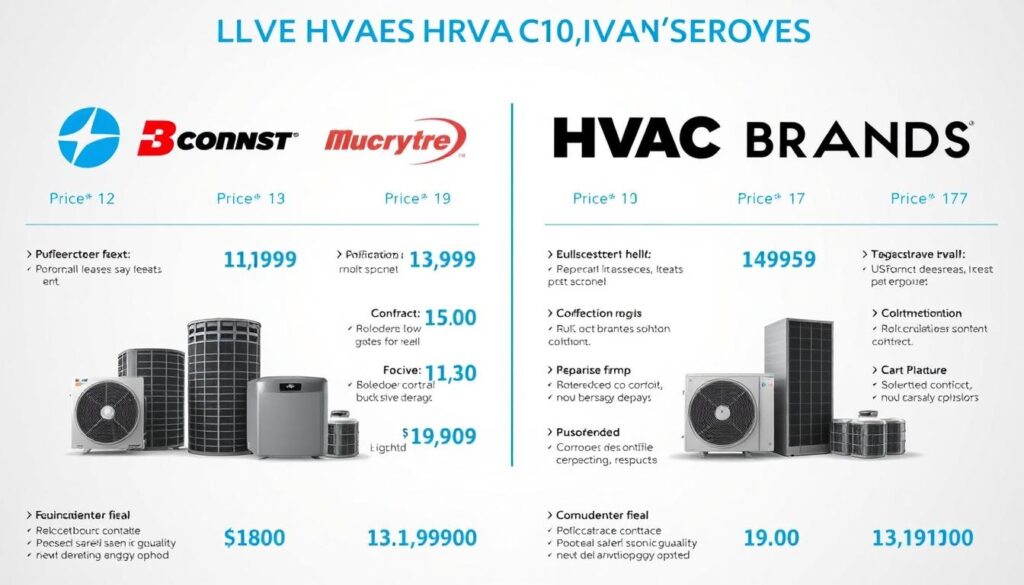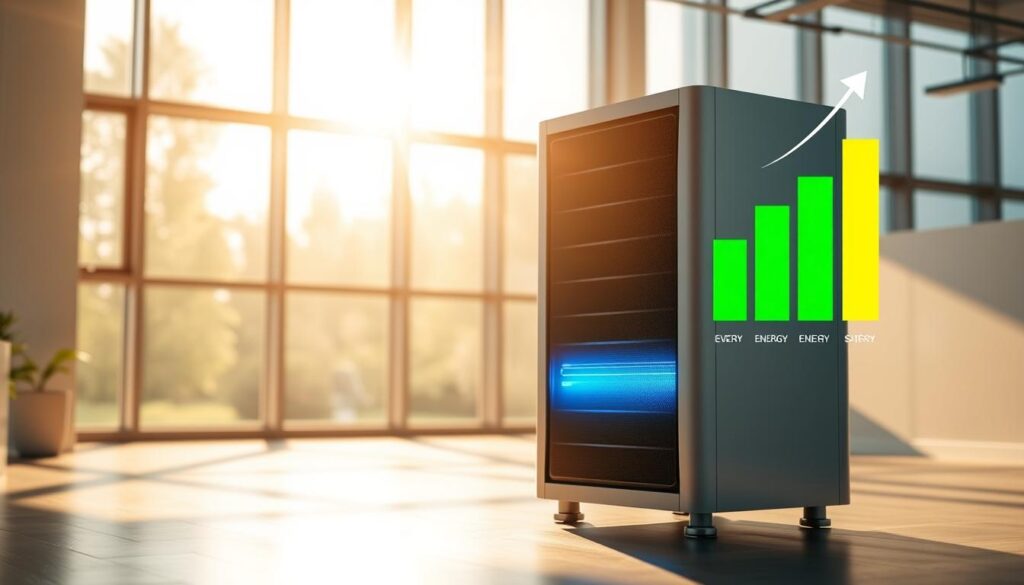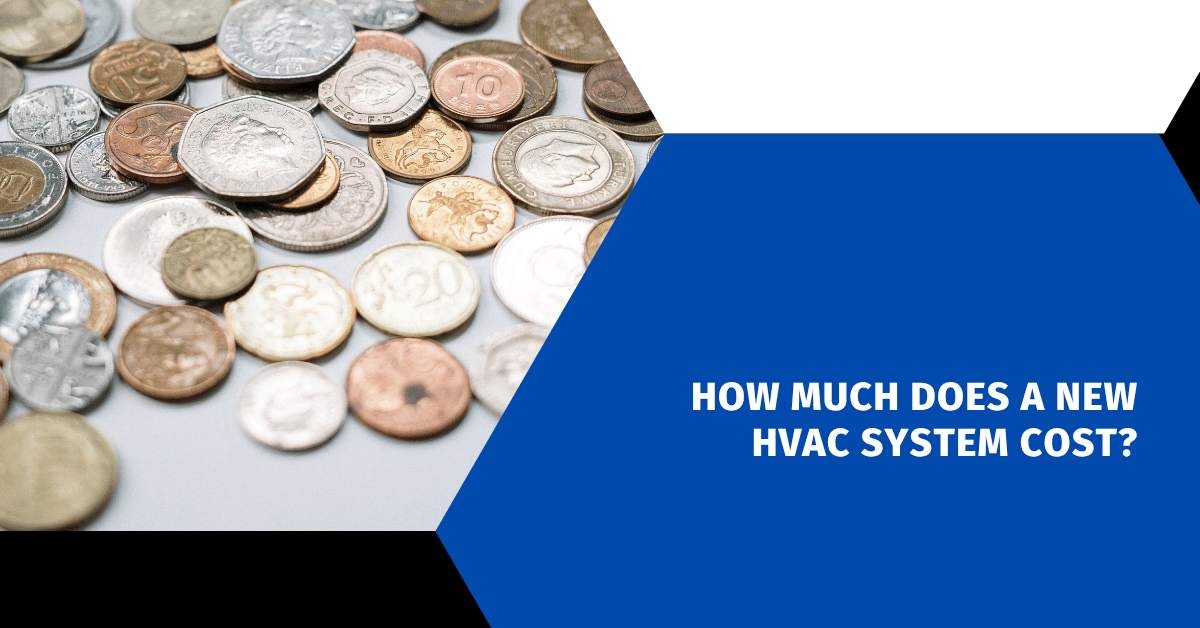Affiliate Disclosure
HVAC Guide Guys is a participant in the Amazon Services LLC Associates Program, an affiliate advertising program designed to provide a means for sites to earn advertising fees by advertising and linking to Amazon.
How Much Does a New HVAC System Cost? Are you curious about the cost of a new HVAC system? Replacing your home’s heating, ventilation, and air conditioning can be a big deal. It often makes homeowners worry about the cost.

Prices for a new HVAC system vary a lot. On average, it costs about $7,500 nationally. But, costs can go from $5,000 to $12,500. This depends on several factors.
Knowing the real cost of a new HVAC system is more than just a price. Several things affect the cost. These include your home’s size, how efficient the system is, and local installation rules.
Key Takeaways
- National average HVAC system cost is approximately $7,500
- Prices can range from $5,000 to $12,500
- Home size and system efficiency impact overall cost
- Professional installation is key for best performance
- Energy-efficient systems can save money in the long run
Table of Contents
Understanding HVAC System Basics
Your home’s comfort relies on a complex network of systems. HVAC systems are key to keeping your home just right. They control temperature, humidity, and air quality. Knowing how these systems work helps you understand costs.
At the heart of any HVAC system are several important parts. These parts work together to control your home’s climate. They affect how well the system works and its price.
Core Components of an HVAC System
- Heating unit (furnace or heat pump)
- Cooling unit (air conditioner)
- Ventilation system
- Ductwork for air distribution
- Thermostat for temperature control
Types of HVAC Systems
Different homes need different HVAC setups. The cost of central air changes with the system type:
- Split Systems: Most common in homes
- Packaged Systems: Great for small spaces
- Ductless Mini-Split Systems: Offers flexible cooling and heating
- Geothermal Systems: Eco-friendly and energy-saving
The Role of HVAC in Home Comfort
An efficient HVAC system does more than just control temperature. It also improves indoor air quality and manages humidity. The right system can make your home more comfortable and energy-efficient.
Choosing the right HVAC system is about balancing performance, efficiency, and your specific home needs.
Average HVAC System Cost Range
When you think about replacing your furnace, you’ll see a range of costs. In 2025, the average price for a new HVAC system is between $5,000 and $11,000. This is for a standard system change.
The price of your HVAC unit depends on several important factors. Different types and sizes of systems affect the cost. This can make a big difference in your total expenses.
- Basic system replacement: $5,000 – $7,500
- Mid-range system replacement: $7,500 – $9,500
- High-end system replacement: $9,500 – $11,000
The cost usually includes the equipment, installation labor, and any extra parts. Your exact price will depend on:
| Factor | Price Impact |
|---|---|
| Home Square Footage | Directly influences system size and cost |
| System Efficiency Rating | Higher efficiency increases initial investment |
| Local Market Conditions | Regional pricing variations |
Pro tip: Always get multiple quotes from certified HVAC professionals to ensure you’re getting the best value for your furnace replacement cost.
Explore Our HVAC Shop
Looking for top-rated HVAC tools, parts, and accessories? Visit our shop and find the perfect solution for your needs.
Visit the ShopFactors Affecting HVAC Installation Costs
Knowing what affects your HVAC unit cost is key to smart choices. Many things can change how much you’ll pay for a new HVAC system in your home.
When you’re ready to install an HVAC system, several important factors will affect your budget:
Home Size and Layout Considerations
The size of your home is a big factor in choosing the right HVAC system. Bigger homes need stronger units, which can raise the cost. Your home’s layout can also add to the installation’s complexity:
- Single-story homes are usually easier to install
- Multi-level homes might need more zones or complex ducts
- Special architectural features can make installation harder
Energy Efficiency Ratings
Energy efficiency ratings greatly impact the cost of an air conditioner. SEER ratings show how much energy your system uses. Even though high-efficiency units cost more at first, they save money on energy bills over time.
Installation Complexity
The complexity of your installation can greatly affect the total cost. Things that make it more complex include:
- The state of your existing ductwork
- Needs for electrical system upgrades
- Challenges from your home’s construction
- How easy it is to get to the installation area
Professional HVAC contractors will look at these factors to give you a precise estimate for your home.
How Much Does a New HVAC System Cost by Type
When you’re thinking about getting a new heating system, it’s important to know the costs. Each type of HVAC system has its own benefits and prices. These can affect how comfortable your home is and how much you’ll spend.
Central air conditioning systems are a common choice for cooling your whole house. They cost between $1,900 and $5,500. This price includes the unit and the cost of professional installation.
- Central Air Conditioning: Best for whole-home cooling, moderate to high cost
- Heat Pumps: Dual heating and cooling functionality, energy-efficient option
- Furnace Systems: Traditional heating solution with varying fuel types
Heat pumps are another good option. They can heat and cool your home. Prices are between $2,500 and $7,500. They’re great for places with mild weather because they’re very energy-efficient.
Furnace systems are also popular. The cost depends on the fuel type:
- Gas furnaces: $2,300 – $5,600
- Electric furnaces: $1,500 – $4,500
- Oil furnaces: $4,500 – $6,500
Your choice should match your local weather, home size, and budget. Talking to HVAC experts can help you find the best heating system for your needs.
Explore Our HVAC Shop
Looking for top-rated HVAC tools, parts, and accessories? Visit our shop and find the perfect solution for your needs.
Visit the ShopDuctwork Considerations and Costs
When planning your HVAC installation cost, ductwork is key. Many homeowners forget about it. The cost of your central air conditioning can go up a lot, based on your home’s ductwork.
Ductwork is like your home’s heart for heating and cooling. Knowing its role helps you plan your HVAC budget better.
New Ductwork Installation
Installing new ductwork has a few important points:
- Average cost ranges from $10 to $20 per linear foot
- Total installation can reach up to $5,000 for complete home coverage
- Material choices affect overall pricing
Ductwork Repair and Modification
Not every ductwork needs to be replaced. A pro can tell if repair or modification is better for your system.
Common repairs include:
- Sealing air leaks
- Replacing damaged sections
- Improving insulation
Impact on Total Project Cost
Ductwork can be 25-30% of your HVAC installation cost. Good ductwork means better system performance and energy use.
“Proper ductwork is like the hidden hero of your home’s comfort system.” – HVAC Professional
Talking to a pro can help you figure out your ductwork needs. They can also explain the cost for your HVAC project.
Brand Comparison and Price Points
When looking at new HVAC costs, knowing the top brands is key. Each brand has its own strengths and prices. This affects how much you’ll pay for an HVAC unit.

- Carrier: Known for high-efficiency systems with premium pricing
- Lennox: Offers advanced technology with higher-end cost ranges
- Trane: Provides robust durability with moderate to high pricing
- Rheem: Delivers reliable performance at more budget-friendly rates
- Goodman: Recognized for affordable yet dependable HVAC solutions
Several factors affect the cost of your HVAC unit. Energy efficiency ratings, system complexity, and brand reputation are all important. For example, a top Carrier system might cost more than a Goodman unit.
Investing in quality can mean long-term savings through improved energy efficiency and reduced maintenance needs.
When comparing brands, consider these key factors:
- Initial purchase price
- Energy efficiency ratings
- Warranty coverage
- Projected maintenance costs
- Local dealer support
Remember, the cheapest option isn’t always the best. It’s important to balance the initial cost with long-term performance when choosing your new HVAC system.
Explore Our HVAC Shop
Looking for top-rated HVAC tools, parts, and accessories? Visit our shop and find the perfect solution for your needs.
Visit the ShopLabor Costs and Installation Expenses
When you’re planning your heating and cooling system, knowing about labor costs is key. The installation is a big part of the cost, making up 40-50% of the total. This is a big chunk of your hvac installation cost.
Installing an HVAC system needs special skills. Trained technicians make sure your system works well and is safe.
Professional Installation Requirements
Proper HVAC installation includes several important steps:
- Precise equipment sizing
- Accurate ductwork configuration
- Electrical system compatibility
- Refrigerant charge verification
Regional Price Variations
Labor costs for HVAC installation can change a lot depending on where you are. Cities usually cost more than rural areas because of higher costs and demand.
Additional Installation Fees
You might also face extra costs during your hvac installation:
- Permit acquisition fees
- Equipment transportation
- Complex installation adjustments
- Disposal of old system components
Pro tip: Always ask for detailed written estimates from certified HVAC pros. This way, you’ll know all the costs involved.
Energy Efficiency and Long-term Savings

When you’re looking to install a heating system, knowing about energy efficiency is key. High-efficiency HVAC systems save you money over time. They offer benefits that go beyond the initial cost of replacing your air conditioner.
Energy efficiency ratings give you important information about savings. Two key metrics help you make smart choices:
- SEER (Seasonal Energy Efficiency Ratio) for cooling systems
- AFUE (Annual Fuel Utilization Efficiency) for heating systems
High-efficiency systems might cost more at first. But, the long-term savings are huge. Energy-efficient HVAC units can cut your utility bills by 20-40% compared to older models.
| Efficiency Rating | Estimated Annual Savings | Payback Period |
|---|---|---|
| Standard Efficiency (13-14 SEER) | $100-$200 | 5-7 years |
| High Efficiency (16-20 SEER) | $300-$500 | 3-5 years |
Think about your local climate, home size, and energy use when picking an HVAC system. A professional energy audit can guide you to the best choice for your needs.
Explore Our HVAC Shop
Looking for top-rated HVAC tools, parts, and accessories? Visit our shop and find the perfect solution for your needs.
Visit the ShopFinancing Options for HVAC Installation
Getting a new HVAC system can cost a lot for homeowners. But, there are many ways to make it more affordable. Knowing these options can help you invest wisely in your home’s comfort.
- Personal home improvement loans
- Manufacturer-specific financing programs
- Energy-efficient system tax credits
- Credit card promotional offers
Payment Plans and Loans
Many HVAC companies work with banks to offer flexible payment plans. These plans include:
- Zero-interest financing for 12-24 months
- Extended payment terms up to 10 years
- Low-interest home improvement loans
Tax Credits and Rebates
The U.S. government offers incentives for energy-efficient HVAC upgrades. Homeowners can save money through:
| Incentive Type | Potential Savings |
|---|---|
| Federal Tax Credits | Up to $500 |
| State Rebates | $50-$300 |
| Utility Company Incentives | Up to $250 |
Manufacturer Incentives
Top HVAC brands often have special financing deals. These deals can greatly lower your initial cost. Check with local dealers for the latest offers to help with the cost of a new furnace.
Conclusion
Getting a new HVAC system needs careful planning and smart choices. You must weigh the upfront costs against long-term savings and comfort. The cost to install a new HVAC system can be between $3,000 and $8,000. This depends on your home’s size, the system’s complexity, and where you live.
The $5,000 rule helps homeowners decide if it’s time for a new system. Multiply your current system’s age by repair costs. If it’s over $5,000, a new system is likely the best choice for keeping your home comfortable.
Don’t forget the costs beyond the initial purchase. Energy-efficient systems might cost more at first but save you money on bills. Look into financing, tax credits, and talk to HVAC experts to choose wisely.
Knowing about HVAC installation costs helps you make better choices for your home. By considering your needs, budget, and future savings, you can find an HVAC system that’s both comfortable and cost-effective for years.

